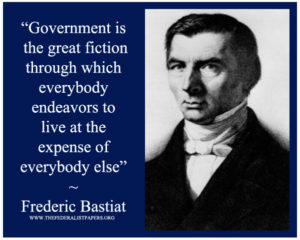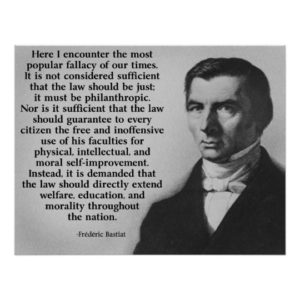Bastiat’s Law: God’s rules for living
10 Sunday Nov 2019
Written by dennisghurst in Inspiration, Knowledge, Origins
Tags
Abraham Lincoln, Christ, Christianity, Conservatism, Constitutional Republic, Donald Trump, Everlasting, Experience, Family, Freedom, Genealogy, God, Jesus Christ, Lessons, Liberty, Life, Posterity, Self-Preservation, Teaching, Texas, United States, Wisdom
Share it

Frédéric Bastiat’s lifelong credo was a simple ‘Life Is a Gift from God’. We hold from God the gift which includes all others. This gift is life – physical, intellectual, and moral.
But life cannot maintain itself alone. The Creator of life has entrusted us with the responsibility of preserving, developing, and perfecting it. In order that we may accomplish this, He has provided us with a collection of marvelous faculties.
Life, faculties, production – in other words, individuality, liberty, property – this is man. And in spite of the cunning of artful political leaders, these three gifts from God precede all human legislation, and are superior to it; it was the fact that life, liberty, and property existed beforehand that caused men to make laws in the first place.
With that very much in mind, I give you ‘Five Best Sentences of Wisdom’ for our current (as of November 9 2019) would-be Congressional Legislators to mull over in regard to the present gridlock. Culled in no particular order from the above-mentioned Frederic Bastiat’s The Law.
1. You cannot legislate the poor into prosperity, by legislating the wealthy out of prosperity.
Reaction
This line of reasoning brings us to a challenging question: If people are as incapable, as immoral, and as ignorant as the politicians indicate, then why is the right of these same people to vote defended with such passionate insistence? We hold from God the gift which, as far as we are concerned, contains all of Life – physical, intellectual, and moral.
2. What one person receives without working for, another person must work for without receiving.
Reaction
But we assure the socialists that we repudiate only forced organization, not natural organization. We repudiate the forms of association that are forced upon us, not free association. We repudiate forced fraternity, not true fraternity. We repudiate the artificial unity that does nothing more than deprive persons of individual responsibility. We do not repudiate the natural unity of mankind under Providence.
3. The government cannot give to anybody anything that the government does not first take from somebody else.

Reaction
The person who profits from this law will complain bitterly, defending his acquired rights. He will claim that the state is obligated to protect and encourage his particular industry; that this procedure enriches the state because the protected industry is thus able to spend more and to pay higher wages to the poor workingmen.
Do not listen to this sophistry by vested interests. The acceptance of these arguments will build legal plunder into a whole system. The present-day delusion is an attempt to enrich everyone at the expense of everyone else; to make plunder universal under the pretense of organizing it.
4. You cannot multiply wealth by dividing it.
Reaction
Sometimes the law defends plunder and participates in it. Thus the beneficiaries are spared the shame and danger that their acts would otherwise involve. But how is this legal plunder to be identified? Quite simply. See if the law takes from some persons what belongs to them and gives it to the other persons to whom it doesn’t belong. See if the law benefits one citizen at the expense of another by doing what the citizen himself cannot do without committing a crime. Then abolish that law without delay – No legal plunder; this is the principle of justice, peace, order, stability, harmony and logic.
5. When half of the people get the idea that they do not have to work, because the other half is going to take care of them; and when the other half gets the idea that it does no good to work, because somebody else is going to get what they work for; that is the beginning of the end of any nation!
Reaction
You say: “There are persons who lack education” and you turn to the law. But the law is not, in itself, a torch of learning which shines its light abroad. The law extends over a society where some persons have knowledge and others do not; where some citizens need to learn, and others can teach. In this matter of education, the law has only two alternatives: It can permit this transaction of teaching-and-learning to operate freely and without the use of force, or it can force human wills in this matter by taking from some of them enough to pay the teachers who are appointed by government to instruct others, without charge. But in the second case, the law commits legal plunder by violating liberty and property.

Bastiat’s Summary …
God has given to men all that is necessary for them to accomplish their destinies. He has provided a social form as well as a human form. And these social organs of humans are so constituted that they will develop themselves harmoniously in the clean air of liberty. Away, then, with the quacks and organizers! Away with their rings, chains, hooks and pincers! Away with their artificial systems! Away with the whims of governmental administrators, their socialized projects, their centralization, their tariffs, their government schools, their state religions, their free credit, their bank monopolies, their regulations, their restrictions, their equalization by taxation, and their pious moralizations!
Let the legislators end where they should have begun: May they reject all systems, and try liberty; for liberty is an acknowledgment of faith in God and His works.
********************
As a footnote, the great Walter E. Williams put it thusly: I must have been forty years old before reading Frederic Bastiat’s classic The Law. Many philosophers have made important contributions to the discourse on liberty, Bastiat among them. But Bastiat’s greatest contribution is that he took the discourse out of the ivory tower and made ideas on liberty so clear that even the unlettered can understand them and statists cannot obfuscate them. Clarity is crucial to persuading our fellowman of the moral superiority of personal liberty.[end]
Bastiat’s classic lives on…
********************
Link to Walter E. Williams and Frederic Bastiat’s The Law
Full content based upon Frédéric Bastiat’s The Law published in 1850.
********************

Soli Deo Gloria!

 Link To DennisGHurst.com
Link To DennisGHurst.com


